Oregon Teachers Standards and Practices Commission (TSPC), established in the U.S. state of Oregon in 1965, is the nation's oldest educator standards board. [1] It is Oregon's licensing agency for all educators. [2] The agency approves teacher preparation programs offered by Oregon colleges and universities; licenses teachers, administrators and other personnel employed in Oregon schools; and takes disciplinary actions when educators commit crimes or violate competent and ethical performance standards. [2]
In 2014, TSPC began a four-year rollout of a "teacher performance assessment" exam, or an "ed-T-P-A". Developed at Stanford University, Ed-T-P-A puts a focus on "planning lessons, instructing students, and assessing learning". [3]
The Oregon Higher Education Coordinating Commission (HECC) supported TSPC efforts in 2018 to explore alternatives to standardized testing to improve diversity in the teaching workforce. [4] In 2022, both agencies worked on the 2022 Oregon Educator Equity Report to identify institutional and structural practices impacting diverse educators. [5]

A psychologist is a professional who practices psychology and studies mental states, perceptual, cognitive, emotional, and social processes and behavior. Their work often involves the experimentation, observation, and interpretation of how individuals relate to each other and to their environments.
The Chartered Financial Analyst (CFA) program is a postgraduate professional certification offered internationally by the US-based CFA Institute to investment and financial professionals. The program teaches a wide range of subjects relating to advanced investment analysis—including security analysis, statistics, probability theory, fixed income, derivatives, economics, financial analysis, corporate finance, alternative investments, portfolio management—and provides a generalist knowledge of other areas of finance.

Education in Bangladesh is administered by the country's Ministry of Education. The Ministry of Primary and Mass Education implements policies for primary education and state-funded schools at a local level. Education in Bangladesh is compulsory for all citizens until the end of grade eight. Primary and secondary education is funded by the state and free of charge in public schools.

Health education is a profession of educating people about health. Areas within this profession encompass environmental health, physical health, social health, emotional health, intellectual health, and spiritual health, as well as sexual and reproductive health education.

Western Governors University (WGU) is a private, non-profit, online university based in Millcreek, Utah. The university uses an online competency-based learning model, providing advanced education for working professionals. Degrees awarded by WGU are accredited by the Northwest Commission on Colleges and Universities (NWCCU). The university was founded by 19 U.S. governors in 1997 after the idea was formulated at a 1995 meeting of the Western Governors Association to expand education offerings to the internet.

The New York State Education Department (NYSED) is the department of the New York state government responsible for the supervision for all public schools in New York and all standardized testing, as well as the production and administration of state tests and Regents Examinations. In addition, the State Education Department oversees higher education, cultural institutions such as museums and libraries, vocational rehabilitation, and the licensing of numerous professions. It is headed by the Board of Regents of the University of the State of New York (USNY) and administered by the Commissioner of Education.
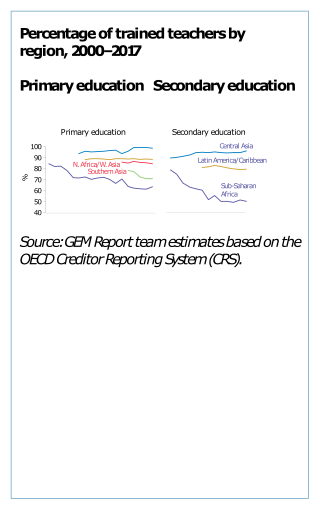
Teacher education or teacher training refers to programs, policies, procedures, and provision designed to equip (prospective) teachers with the knowledge, attitudes, behaviors, approaches, methodologies and skills they require to perform their tasks effectively in the classroom, school, and wider community. The professionals who engage in training the prospective teachers are called teacher educators.
The National Center on Education and the Economy (NCEE) is an American not-for-profit education research, advocacy, and educator professional learning organization based in Washington, DC, that first formed in 1988 as the Carnegie Forum on Education and the Economy.
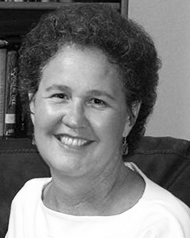
Linda Darling-Hammond is an American academic who is the Charles E. Ducommun Professor of Education Emeritus at the Stanford Graduate School of Education. She was also the President and CEO of the Learning Policy Institute. She is author or editor of more than 25 books and more than 500 articles on education policy and practice. Her work focuses on school restructuring, teacher education, and educational equity. She was education advisor to Barack Obama's 2008 presidential campaign and was reportedly among candidates for United States Secretary of Education in the Obama administration.
The National League for Nursing (NLN) is a national organization for faculty nurses and leaders in nurse education. It offers faculty development, networking opportunities, testing services, nursing research grants, and public policy initiatives to more than 45,000 individual and 1,000 education and associate members.

A certified teacher is an educator who has earned credentials from an authoritative source, such as the government, a higher education institution or a private body or source. This teacher qualification gives a teacher authorization to teach and grade in pre-schools, primary or secondary education in countries, schools, content areas or curricula where authorization is required. While many authorizing entities require student teaching experience before earning teacher certification, routes vary from country to country.
The California Basic Educational Skills Test (CBEST) is a standardized test administered in the state of California. It is available as an option in Oregon and Nevada. The test is intended to score basic proficiency in reading, mathematics, and writing. The test is divided into three sections: the reading and math sections each containing 50 multiple-choice questions; and the writing section, consisting of two essay questions. The entire test must be completed in four hours, and test-takers may allocate the time to each section at their discretion. There is no limit to the number of times the test may be taken. Test-takers do not have to pass all three sections in one sitting. A $41 registration fee for paper-based testing must be paid each time the test is taken.
WestEd is a San Francisco-based nonprofit organization. The organization's mission states, "WestEd, a research, development, and services agency, works with education and other communities to promote excellence, achieve equity, and improve learning for children, youth, and adults."
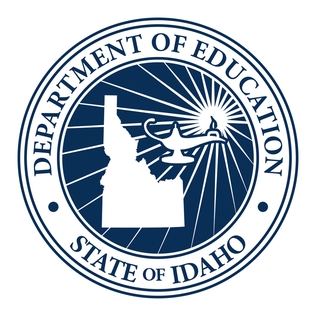
The Idaho State Department of Education is an executive agency of the Idaho state education system. The department is responsible for public elementary and secondary school matters as provided by Title 33, Idaho Code, or as determined by the Idaho State Board of Education. It is headquartered in the state capital, Boise, Idaho.
The Common Core State Standards Initiative, also known as simply Common Core, was a multi-state educational initiative begun in 2010 with goal of increasing consistency across state standards, or what K–12 students throughout the United States should know in English language arts and mathematics at the conclusion of each school grade. The initiative was sponsored by the National Governors Association and Council of Chief State School Officers.
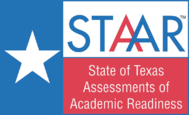
The State of Texas Assessments of Academic Readiness, commonly referred to as its acronym STAAR, is a series of standardized tests used in Texas public primary and secondary schools to assess a student's achievements and knowledge learned in the grade level. It tests curriculum taught from the Texas Essential Knowledge and Skills, which in turn is taught by public schools. The test used to be developed by Pearson Education every school year, although the most recent contract gave Educational Testing Service a role in creating some of the tests, under the close supervision of the Texas Education Agency.
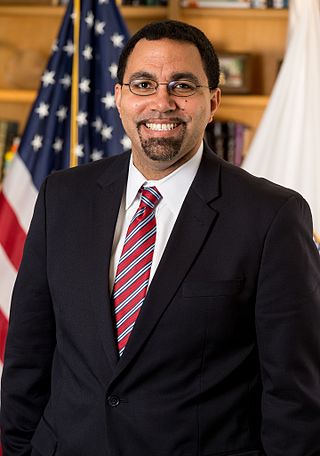
John B. King Jr. is an American educator, civil servant, and former state and federal government official who is the 15th Chancellor of the State University of New York (SUNY). He previously served as President & CEO of The Education Trust, a national civil rights nonprofit which seeks to identify and close opportunity and achievement gaps for students from preschool through college. A member of the Democratic Party, he served as the 10th United States Secretary of Education from January 1, 2016, to January 20, 2017, under President Barack Obama. In April 2021, King announced that he would be running for the Democratic nomination in the 2022 Maryland gubernatorial election, but came in sixth place in the primary election, losing to Baltimore author Wes Moore.

The National Council on Teacher Quality (NCTQ) is a think tank founded in 2000 and based in Washington, D.C. that researches, evaluates, and provides information and guidance on the topics of teacher preparation, teacher pay, educator equity, and diversity. It is primarily known for its Teacher Prep Review, a report first released in June 2013 with subsequent editions in 2014, 2016, 2017, 2018, and 2020, that found American teacher education programs largely inadequate.

In the United States, elementary schools are the main point of delivery of primary education, for children between the ages of 4–11 and coming between pre-kindergarten and secondary education.
The Council for the Accreditation of Educator Preparation (CAEP) is a professional accreditor focused on accrediting teacher education programs in U.S. colleges and universities. It was founded in 2013 as a result of the merger of two predecessor organizations, the Teacher Education Accreditation Council (TEAC) and the National Council for Accreditation of Teacher Education (NCATE).